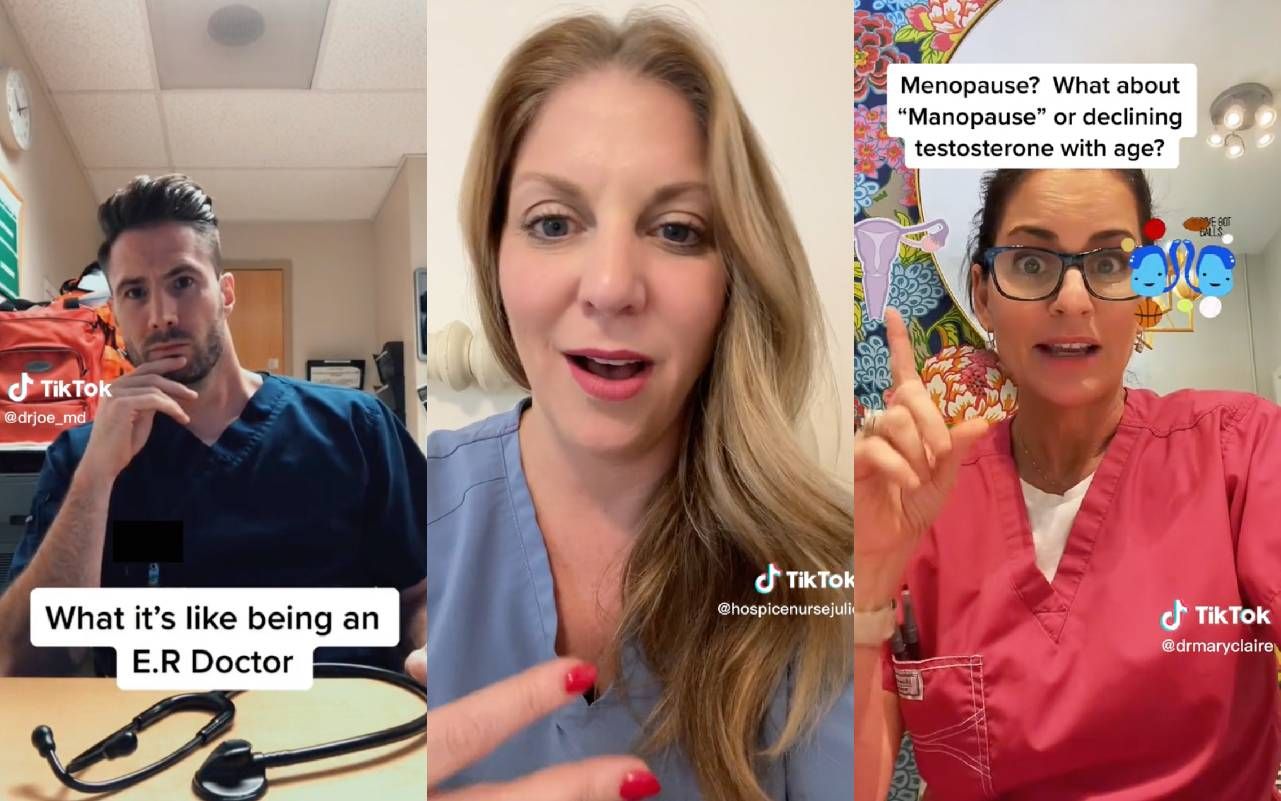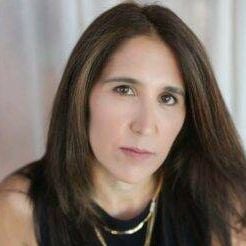How Medical Professionals Are Using TikTok To Teach
TikTok is a surprisingly valuable platform for addressing tough topics like hospice and death
Several months ago, my father decided that after eight years of fighting his cancer with immunotherapy, he wanted to stop treatment. His oncologist supported his decision and said my father would qualify for at-home hospice care.

While I had heard of hospice, I didn't fully understand what end-of-life care would entail. So to prepare for what was to come and be able to support my father fully, I did a lot of research online to educate myself.
To my surprise, one of the best resources was a woman on TikTok named Julie McFadden (@HospiceNurseJulie),40, a hospice nurse and educator. I never expected that my kids' platform for entertainment would provide me with so much valuable information.
Why Medical Professionals Go On TikTok
As a hospice nurse, McFadden provides end-of-life care and supports to terminal patients and their loved ones. She has also helped many of her friends through losing their parents.
"I had never thought about using social media as a vehicle to discuss hospice, but I decided to upload a video to see if there was interest."
McFadden says, "Even though death is a natural part of life, there is a lack of understanding about the realities of death. Friends I have helped always said, 'I didn't know this would happen or that this is normal at the end of life. People need to know this stuff.' I had insights that could help people."
McFadden knew about TikTok from her teenage nieces. "I had never thought about using social media as a vehicle to discuss hospice, but I decided to upload a video to see if there was interest. Four days later, I was amazed at the response; from there, the audience has continued to grow."
California ER doctor Joe Whittington (@DrJoe_MD), 45, also thought of TikTok as just a kid's app with funny videos. "My first post was a funny video, purely for entertainment," explains Whittington. "But then I realized I could use the platform professionally to create content that would educate people about basic medical information."
Dr. Mary Claire Haver (@drmaryclaire), an OB/GYN, is another medical professional using TikTok to share her insight, including information on menopause.
Haver, the author of "The Galveston Diet," says, "There is a systematic problem in how we provide basic care to women, how we teach and train our providers to care for patients, particularly in menopause, and how society views and treats menopausal women."
"In addition, there is a knowledge gap among women about menopause, which could substantially negatively influence their quality of life," Haver says.
Her frustration about the situation led her to take her insight to TikTok. "My daughters suggested I get on TikTok. So I started playing around a little bit, sharing my message, and before I knew it, I developed quite a following," says Haver. "Not bad for a 54-year-old menopausal woman!"
TikTok As A Learning Tool
Beyond its entertainment value, TikTok is becoming a valuable learning tool.
"There is also information that I know as a doctor that I thought was common knowledge, but I've learned through my interactions on TikTok that isn't the case," says Whittington. "So I can be a resource for a lay person where they can gain a better understanding and ask questions they might not feel comfortable asking a doctor in person."
"Before I knew it, I developed quite a following; not bad for a 54-year-old menopausal woman!"
"Many women shy away from talking about their menopausal symptoms in real life with friends, family, and most critically, their doctors," says Haver. She sees TikTok as a resource where she can provide insight and dispel misinformation, especially regarding marketing campaigns geared toward menopausal women.
"I think women get caught up in the diet mindset and the trappings of quick-fix marketing," explains Haver. "There is no potion, pill or powder to 'balance' hormones and many phrases that have been created and passed off as medical terms are merely terms used to explain problems away such as 'adrenal fatigue.' Sometimes, people overcomplicate things as well. A healthy lifestyle doesn't need to be complicated."
Death is another topic that many find difficult to talk about. "There is so much misinformation such as physically dying is painful (it's not; disease is painful), morphine causes death or hospice speeds up dying on purpose, all of which is untrue," McFadden says. "Learning more about the dying process decreases the fear. My hope is help people live and die better."
Beware of Inaccurate Information
No social media outlet, including TikTok, is meant for diagnosing illness or any other medical-type care. "People sometimes ask me specific questions about their health or a family member's condition," says Whittington.
"People need to exercise caution and ensure the source they are following is accredited or licensed and is not spreading false, misleading or dangerous information."
"It's not possible to provide medical advice or diagnoses. It would be unethical and grounds for malpractice," he explains. "What I can offer is general information such as how to avoid a trip to the ER, common things that happen at an ER visit and good questions to ask the medical provider when you are in an emergency."
Be wary of the source; not all content creators have the same goals. "People need to exercise caution and ensure the source they are following is accredited or licensed and is not spreading false, misleading or dangerous information," says Haver.
"I frequently stitch or reference other medical professionals in my TikToks, or will share information about a source I trust and I'm sure other content creators do the same. Following and learning from trusted sources is a fantastic way to continue to learn, expand interests, engage in various communities, join in conversations and stay informed."
Adds Whittington, "TikTok has strict rules. Sponsored content is supposed to be labeled as such. Users need to do due diligence and ensure they get their information from someone reputable."
Better Understanding
TikTok allows medical professionals to share their insights and professional opinions with a larger, more diverse audience than they can in person.
"I hope to humanize those in the medical profession."
For McFadden, it is an opportunity to educate and dispel myths about what happens at the end of life. "There is so much fear, anxiety and misinformation about death and dying," she says.
"Trying to be helpful, people will advise a loved one who is dying, 'Don't be afraid.' But it is perfectly okay, perfectly normal to be afraid," notes McFadden. "A better, more compassionate way to help is to be willing to talk about what they are going through and not be shy to say the hard things."
One of Whittington's goals is to use the social platform to illustrate to his audience that doctors are human beings. For example, he explains, "Some people see doctors as superheroes while many see them as uncaring. I hope to humanize those in the medical profession."
According to Whittington, one of his most common questions on TikTok is, "How do you deal with giving bad news in the ER?"
He says, "We are human. Bad news does affect us, but we have to stay emotionally distant. We can't break down because we have 20 other patients who need us. So we are trying to strike a balance. I hope to break this misconception that doctors don't care, because we do."


